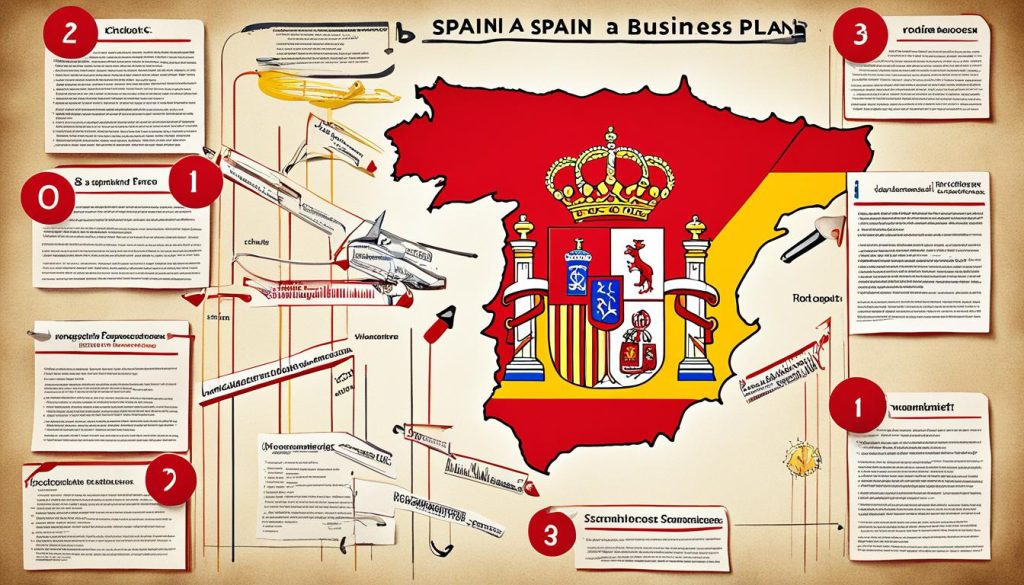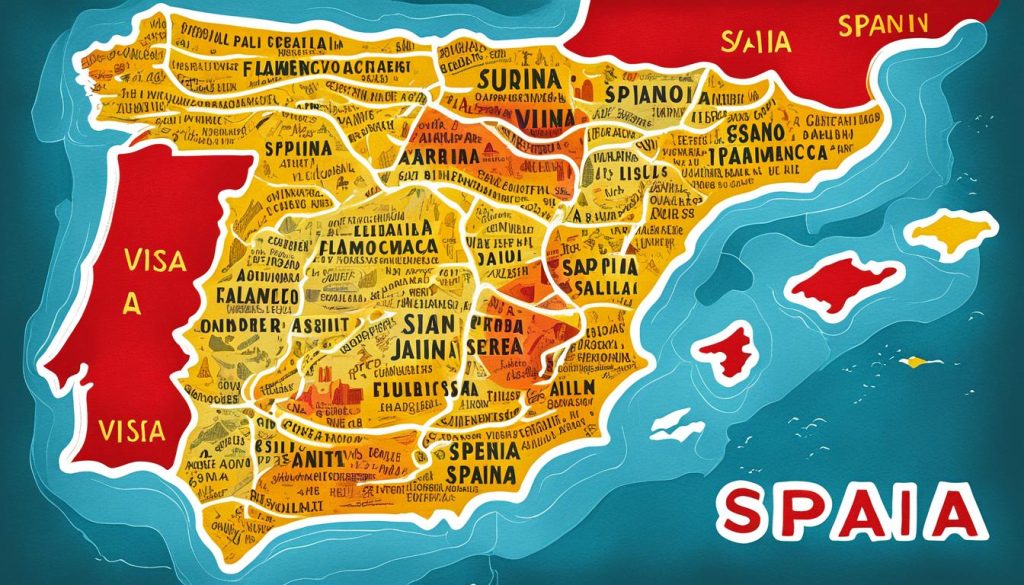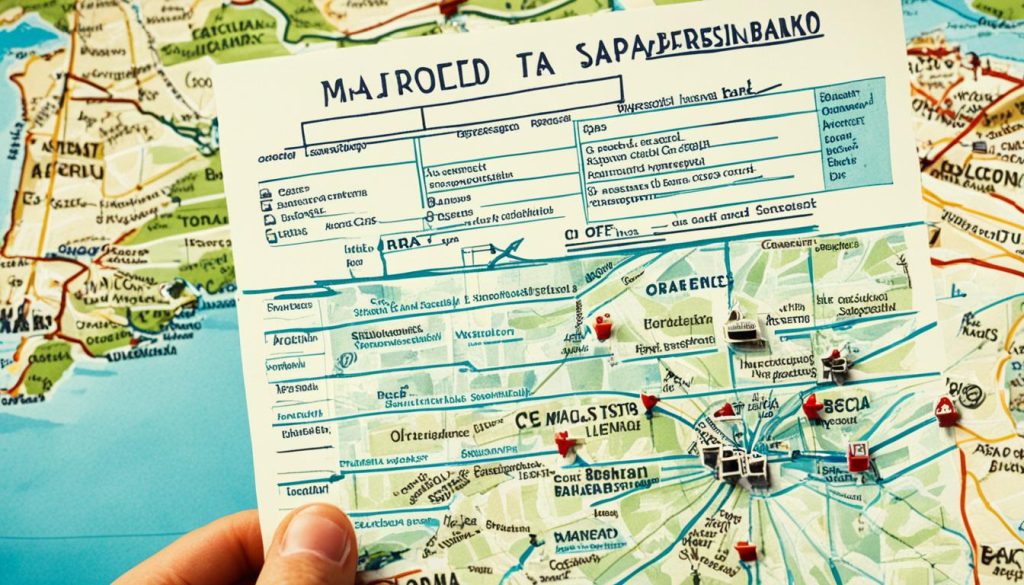Starting a business in Spain is an exciting adventure for entrepreneurs. It involves creating a detailed business plan first. Then, gathering essential documents takes up to a month.
After planning, you need enough money saved. Next, apply for a Schengen visa, which usually takes 6 to 8 weeks. After that, your documents are reviewed over 2-3 months. Finally, you get your residence card around 4-5 weeks after your fingerprints are taken.
To start your company, you need some key documents. These include a clean criminal record certificate, health insurance, bank statements, and a detailed business plan for ENISA. Make sure to sign up for Spanish social security, pay the government fee, fill in Form MI-T, and possibly choose a representative. Websites like Migrin provide great advice for moving and setting up.
Key Takeaways
- Develop a detailed business plan and gather necessary documents.
- Ensure sufficient savings in your bank account.
- Obtain a Schengen visa and prepare for a thorough document review process.
- Acquire a certificate of no criminal record and secure health insurance.
- Register in the Spanish social security system and pay the state fee.
- Upload your business plan to ENISA.
- Consider appointing a legal representative for smoother relocation.
Introduction to Starting a Business in Spain

Madrid is at the heart of Spain’s booming startup scene. It stands out in Europe thanks to its dynamic expat community and growing investment opportunities. The city is alive with startups focusing on AI, social media, and e-commerce.
For those eager to join the Spanish startup scene, there’s no shortage of support. Coworking spaces, startup programs, and venture capital are plentiful. Together, they create a strong network for founders and industry experts.
Madrid combines economic growth with rich culture, making it an ideal place for startups. Its welcoming ecosystem attracts entrepreneurs from all over the world. This makes Spain a top choice for doing business.
Why Choose Spain for Your Startup

Spain offers an exciting environment for startups. Cities like Madrid have plans to boost innovation. This makes Spain a great choice for entrepreneurs looking around the globe.
Madrid is a key spot for business in Spain. The city works hard to support startups. It’s a place where new companies can grow and succeed.
Spain values teamwork in business. It believes strong teams lead to success. This creates a welcoming space for startups to thrive.
Spain stands out as a startup hub. It mixes strategy, teamwork, and a wide outlook. This sets entrepreneurs on the path to success.
Understanding the Spanish Market

To succeed, knowing the Spanish market well is key. Focus on what customers like, the latest trends, and detailed market checks. This way, businesses can grow by making smart moves.
Market Analysis
An in-depth look at the Spanish market is crucial for entrepreneurs. It’s about spotting gaps and chances to shape your business plan. Knowing the market’s demand and supply helps align with Spanish economic trends.
Industry Trends
Keeping up with Spain’s business opportunities is vital to stay ahead. Innovations in tech and online shopping are changing the game. With more investments in Madrid’s startups, digging into these trends can boost your business.
Consumer Behaviour
Understanding what Spanish customers prefer and buy is important. This insight lets businesses design products that Spanish people love. This knowledge is vital for entering the market successfully and keeping customers.
Types of Business Structures in Spain

Spain offers a variety of business structures to meet different needs. It’s crucial for those looking to start a business in Spain to choose the right type. Each option has its own benefits and rules, suited to various sizes and types of businesses.
The Sociedad Limitada (SL), or Limited Liability Company, is very common in Spain. It’s perfect for small to medium-sized businesses, with a required starting capital of €3,000. Shareholders of an SL enjoy flexible management and their liability is limited.
For larger companies, the Sociedad Anónima (SA), or Public Limited Company, is a good choice. It’s aimed at businesses that want to raise money publicly, with a need for at least €60,000 in capital. An SA has more rules than an SL.
If you’re looking for something simpler, becoming a Sole Trader (Autónomo) might fit. This is great for freelancers and small business owners due to its easy setup. However, it does mean you’re fully responsible for any debts.
Spain also has the Partnership (Sociedad Civil) and Cooperative Society (Sociedad Cooperativa) structures. These options focus on shared responsibilities and working together. They’re designed for businesses that value collaboration and have specific goals.
Deciding on the right business structure in Spain is key. It helps align your business aims with legal requirements. Making a wise choice can smooth your path to business success.
Essential Documents for Starting a Company

When you’re starting a company in Spain, it’s important to gather all key documents. These are crucial for legal matters and setting up. Having them ensures everything runs without a hitch.
Business Plan
A detailed Spain business plan is a must-have. It should outline your idea, analyze the market, and predict finances. Think of it as the foundation of your business in Spain.
Certificate of No Criminal Record
You’ll need a no criminal record certificate from the past five years. It must have legalisation or a Hague Apostille. In addition, it must be officially translated into Spanish.
Health Insurance
Getting health insurance from a recognized provider is essential. It’s needed for your visa, ensuring you’re covered during your stay. This is key for anyone planning a startup in Spain.
Bank Statements
Showing you’re financially stable is critical. Provide bank statements as proof of sufficient funds for you and dependents. It’s necessary for meeting Spain’s financial requirements for newcomers.
Form MI-T
The MI-T form is critical for entrepreneurs in Spain. It covers criminal records and social security pledges. Filling it out right is key to get your entrepreneur visa.
Starting a Company in Spain – Essential Checklist

Starting a business in Spain takes careful planning and a series of important steps. This checklist helps entrepreneurs plan their journey, making sure they don’t miss anything key. It ensures a smooth start and successful growth.
Registration Process
Firstly, you’ll need a business plan. It outlines what your company will do, who it serves, and how it makes money. It also shows your financial forecasts and structures. Next, gather needed documents like ID and proof of address.
Then, in Spain, submit these documents to get everything official. This includes a few steps: giving in the documents, having them checked, and then getting a residence card. This card proves you can legally stay and run your business.
Taxation Requirements
Knowing about taxes in Spain is vital. It makes sure your startup follows the law. Different business types might pay different taxes. It’s key to follow these rules to avoid issues.
Learn about corporate taxes, when to file them, and deductions you can claim. Knowledge of tax norms helps in planning your company’s finances well.
Social Security Registration
Registering with Spanish social security is crucial. It makes your business legal and gives you and your employees benefits. Contributions to this fund are a must. They help with health and pensions.
Getting familiar with Spain’s social security for businesses is beneficial. It ensures you provide the right protections by law. This makes your business compliant and appealing.
Understanding Spanish Corporate Taxes

For startups, knowing the corporate tax system in Spain is key. It helps with planning your business’s money matters. Understanding tax rates, what you can write off, and filing needs is vital.
It’s important for business owners to know about tax liabilities for businesses. Spain has a standard corporate tax rate of 25%. But, there are special price cuts and write-offs, especially for new and creative companies. This helps you use your funds wisely and follow the rules.
Knowing what deductions you can claim can also lower your tax liabilities for businesses. For tech startups, R&D costs can be reduced. This is crucial for your business’s financial plan.
Filing your taxes correctly and on time is also crucial in the corporate tax system in Spain. Companies must turn in their Corporate Income Tax Returns yearly. Doing this right avoids late fees.
In conclusion, understanding the corporate tax system in Spain and tax liabilities for businesses is crucial. It leads to better money management and smoother operations.
Visa Requirements for Entrepreneurs in Spain

If you’re looking to start a business in Spain, knowing about visa requirements is key. Non-EU citizens must first apply for a Schengen visa.
Schengen Visa Application
Getting a Schengen visa is the first step for entrepreneurs. This process needs careful planning and takes about 6 to 8 weeks. Make sure you have all your documents ready for a hassle-free application.
Review Process
The Spanish entrepreneur visa review takes 2-3 months. During this time, you should quickly respond to any extra information requests. Being patient and focusing on the details will help you through this phase.
Obtaining a Residence Card
With a Schengen visa, the next step is getting a residence card. This card allows you to stay and do business in Spain. You must give your fingerprints. The card is usually ready within 4-5 weeks after that.
Finding the Right Location for Your Business in Spain

Choosing the right spot for your business in Spain is key to success. You need to look at local demand, how easy it is to get there, and how close you are to places like Madrid. Spanish markets offer many chances, all different and helpful in their own way.
Arganzuela, a district in Madrid, is now a top place for new businesses. It’s full of life and great for startups. The area is also well-placed, making it easy to find what you need for your business.
Other parts of Madrid are also becoming popular with business people. Each one has its own special market and room for growth. It’s very important to look into these places carefully. Knowing what each Spanish market offers can really help your business do well.
Madrid’s strong support and infrastructure help startups thrive. Finding a place in Spain that fits your business goals matters a lot. Through smart planning, business owners can make the most of these bustling markets.
Building a Strong Network in Spain
Building a good business network in Spain is crucial for success. Entrepreneurs find valuable connections by joining Spain’s business events. These activities are key to understanding the market.
Networking Events
Networking events are great for meeting leaders, investors, and fellow entrepreneurs. They allow for idea sharing and finding collaboration opportunities. This can really help your business grow.
Startup Communities
Joining startup communities in Spain is a smart step for new entrepreneurs. They offer support, share knowledge, and connect you with other business owners. This network helps startups succeed in Spain’s competitive environment.
Co-Working Spaces
Co-working spaces in cities like Madrid are great for startups. They are affordable and inspire collaboration and creativity. These spaces help startups thrive by providing a supportive community.
Access to Venture Capital and Investment Opportunities</h)initialed
Spain’s venture capital market is growing fast, especially in Madrid. This city attracts both investors and startups. It’s turning into a lively center for funding, giving new businesses the money they need.
Many VC firms are now in Madrid, making it a great place for innovative startups looking for investment. With lots of different funding options, companies can grow big and strong. The energetic vibe in Madrid makes it easy for new businesses to find the funding they need to get bigger.
In summary, Spain’s thriving venture capital scene, combined with Madrid’s supportive atmosphere, is perfect for entrepreneurs. It’s the right spot to get the essential funding for a bright future.
Legal Considerations for Startups in Spain
Starting a business in Spain needs careful thought about legal considerations. Rules on how to register, structure, and run your business are crucial. It’s also key to know about intellectual property rights to keep your ideas, brand, and designs safe.
Understanding employment laws is vital for any Spanish startup. These include hiring methods, contracts, working conditions, and benefits for staff. Following these rules avoids issues and ensures a happy workplace.
Depending on your business type, you may face specific laws. Knowing these helps avoid trouble and keeps you lawful. Getting help from a business law expert can make navigating these laws easier.
Address these legal considerations well. This builds a strong base for your startup to succeed in Spain.
Government Support and Incentives for Startups
Spain is known for its strong support to startups with various schemes. It creates an excellent environment for innovation and growth. This help is crucial for entrepreneurs looking to start and grow their businesses.
ENISA Program
The ENISA program is key in the Spanish government’s aid, offering funds to innovative projects. It provides startups with the financial boost needed in early stages. Those applying for ENISA funding find it greatly aids their visionary business plans.
Tax Relief Schemes
The Spanish government also offers tax relief to help startups financially. These include lower corporate tax rates and deductions for research and development. Such measures make it easier for new businesses to thrive, showing the strength of Spanish government support.
Hiring Employees in Spain
For startups in Spain, knowing employment laws is key when hiring. To employ people, you must follow laws that protect workers and outline your duties. It’s important to blend these rules into your hiring ways to keep your workplace legal and productive.
Labour Laws
Spain’s employment laws cover the basic rights and responsibilities of both bosses and workers. Following laws on minimum pay, work hours, and safety is crucial for your business. Startups need to keep updated on these laws to ensure a fair working environment.
Employee Benefits
In Spain, employee perks include holiday pay, maternity and paternity leave, and healthcare. Creating policies that offer these benefits attracts and keeps good staff. It’s vital for business owners to know these benefits and add them to their work practices.
Contract Types
Spain offers various employment contract types, from temporary and part-time to permanent. Picking the right contract for your business needs and following Spanish laws is important. The right contract ensures a dedicated team.
Understanding Spain’s work laws, employee perks, and contract types is crucial for hiring. Applying this knowledge helps startups handle Spain’s employment rules and create a strong team.
Marketing Your Business in Spain
Online marketing is key for startups in Spain looking to make their mark. By blending digital with traditional methods, you can boost your visibility and make your brand stand out.
Digital Marketing Strategies
The digital world is important today. Startups need to use SEO, content marketing, and social media. This helps them reach more people. SEO makes you more visible online. Content marketing builds trust, and social media helps talk directly to customers.
Traditional Advertising
Even with digital everywhere, old-school advertising is still important in Spain. Things like newspapers, TV ads, and radio can reach many people. Adding these to your digital efforts gives a well-rounded strategy. It helps you connect with even more people.
Branding
Crafting a strong brand is a must. Make sure your brand fits well with Spanish culture and what local people like. Think about your logo, what your brand says, and how it looks. A good brand makes you shine among competitors and builds loyalty.
Using these strategies together offers a full plan. It helps your business shine in Spain.
Common Challenges When Starting a Business in Spain
Starting a business in Spain comes with hurdles. Navigating the bureaucracy is one of the main challenges. The complex procedures can be overwhelming, requiring careful planning to avoid delays.
Understanding the local business culture is another big hurdle. The Spanish business scene might be different than what foreign entrepreneurs expect. Learning about local customs is key for success and smooth negotiations.
Language barriers can also make things difficult in Spain. Many Spaniards do speak English, but business is often done in Spanish. Entrepreneurs should think about learning Spanish or hiring bilingual staff.
Getting into the local market needs a deep understanding of Spain’s economy. This includes knowing about what consumers like and market trends. Good research and local insight are vital to overcome challenges and succeed.
Case Studies: Successful Startups in Spain
Looking into Spanish startups’ stories helps those starting their journey. These case studies show the challenges, choices, and growth strategies used.
Cabify, a ride service, has seen vast growth. It shows the value of matching market needs with technology for better service.
Glovo began in Barcelona as a delivery service. It grew fast worldwide, proving quick adaption and a focus on customers lead to success.
Hawkers grew with a smart digital marketing plan. Using social media well shows how understanding your audience can boost your brand in competitive industries.
Spotahome changed how we rent properties for the long-term. It solved a big problem, showing identification and addressing specific needs are key to success.
These stories inspire and give real examples. They show how to work through Spanish market challenges, adapt, and use resources well.
Additional Resources for Entrepreneurs
Exploring the world of Spanish business becomes much easier with the right resources for budding entrepreneurs. These tools offer crucial knowledge and support. They’re every entrepreneur’s guide to success.
Useful Websites
Online, many websites provide detailed guides and tools for starting a business in Spain. Websites like Migrin offer legal templates, forums, and guides, making the startup process smoother.
- Migrin
- StartUp Spain
Books and Guides
For those looking into Spanish businesses, there’s a lot of reading material available. Specifically, “Startup Guide Madrid” gives essential information, expert interviews, and advice for new business owners.
- Startup Guide Madrid
- The Lean Startup by Eric Ries
Professional Services
Utilizing professional services can be a game-changer for entrepreneurs. Experts in law and business consultancy provide crucial, tailored help. This support is key for tackling complicated matters such as immigration and business law.
- Legal Experts
- Business Consultants
Conclusion and Next Steps
Starting a business in Spain is exciting but needs careful planning. This guide shows you how to start, from getting visas to understanding Spanish business rules. It gives you a clear plan for your business journey.
It’s important to know the market and what people want. Use Spain’s lively startup scene, especially in Madrid, to put your business in a good spot. You must also follow the law closely, dealing with taxes and social security.
Thinking about what’s next, remember that good preparation and using available resources are crucial. Connect with local business communities, use co-working spaces, and get help from government programs like ENISA. With this advice, you’re ready to make your dream business a reality in Spain.







